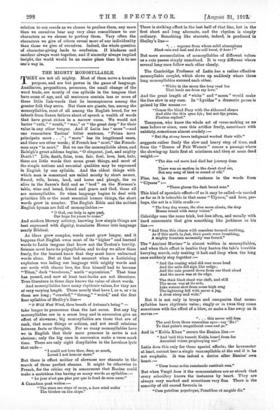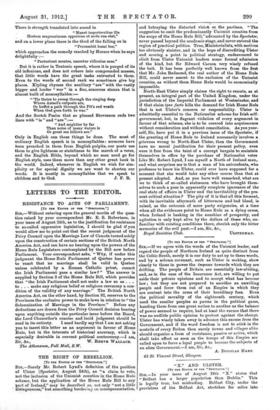THE MIGHTY MONOSYLLABLE.
f[11H_EY, are not all mighty. Most of them serve a humble purpose, and are but pawns in the game of language. Auxiliaries, prepositions, pronouns, the small change of the word trade, are mostly of one syllable in the tongues that have come of age, and all sentences contain less or more of these little link-words that lie inconspicuous among the greater folk they serve. But there are giants, too, among the monosyllables, most of all among the English breed, for we inherit from Saxon fathers short of speech a wealth of words that have great riches in a narrow room. We would not barter "ruth," " wrath," " war," or " the great deep " for their value in any other tongue. And if Latin has " more "—and one remembers Tacitus' bitter sentence, "Prima novo principatu 1110113 . . " ; " mors" has its lengthened cases, and there are other words ; if French has " mort," the French- man says " la mort." But we use the monosyllable alone, and Raleigh's great address begins, "O eloquent, just, and mighty Death!" Life, death, false, true, fair, foul, love, lust, hate, these are little words that mean great things, and most of the simple notions and essential qualities may be expressed in English by one syllable. And the. oldest things with which man is concerned are called mostly bj short names, Sword, wife, house, laud, and horse and plough, the ox alive in the Saxon's field and as "beef " on the Norman's table, wine and bread, friend and grave and God, these all are monosyllables. So when language begins to deal with primitive life or the most essential human things, the short words grow in number. The English Bible and the noblest English hymns are full of monosyllables :—
" 0 God, our help in ages past, Our hope for years to come."
And modern literary artistry, knowing how simple things are best expressed with dignity, translates Homer into language nearly Biblical.
As ideas grow complex, words must grow longer, and it happens that English owes most of its " higher " and learned words to Latin tongues that know not the Teuton's brevity. Science must have its polysyllables, and to-day we allow them freely, for the learned know that they must leave unlearned words alone. But at that bad moment when a Latinizing euphuism was lading our language with mighty words and our souls with classic lore, the Sun himself had to become "Titan," dark "tenebrous," north " septentrion." That time has passed, and now at least text-books are not literature. True literature in these days knows the value of short words.
And monosyllables have many rhythmic values, for they are of very varying length. Those mostly that have 1, or ti, or r in them are long ; "crawled," " throng," " weird," and the first four syllables of Shelley's line- " 0 Wild West Wind, thou breath of Autumn's being" take longer to pronounce than the last seven. But any big monosyllables are in a sense long and in succession give an effect of slowness; big monosyllables are those that are of rank, that mean things or actions, and not small relations between facts or thoughts. For so many monosyllables have we in English that their mere presence in series is not obvious ; only the big ones in succession make a verse mark time. There are only eight dissyllables in the Lovelace lyric that ends—
"I could not love thee, dear, so much, Loved I not honour more."
But there is effect neither of slowness nor staccato in the march of those perfect stanzas. It might be otherwise in French, for the critics cry in amazement that Racine could make a matchless line having as many words as syllables:- " Le jour n'est pas plus par que le fond de mon come"
A Canadian poet writes :— " The stars are stars of morn, a keen wind wakes
The birches on the slope."
There is striking effect in the last half of that line, but in the first short and long alternate, and the rhythm is simply ordinary. Something like staccato, indeed, is produced in Shelley's line- ". . . vapours from whose solid atmosphere Black rain and hail and fire will burst, 0 hear ! "
But mere accumulation of monosyllables of different values
as a rule passes simply unnoticed. It is very different where several long ones follow each other closely.
The Cambridge Professor of Latin has a rather effective monosyllabic couplet, which slows up suddenly where three long monosyllables succeed each other.
" White in the moon the long road lies That loads me from my love."
And the great length of " white " and "moon" would make the line slow in any case. In " Lycidas " a dramatic pause is gained by like means :— "Comes the blind Fury with the abhorred shears And slits the thin svun life ; but not the praise, Phoebus replied."
Tennyson, who knew the whole art of verse-making as no man before or since, uses this artifice freely, sometimes with subtlety, sometimes almost crudely:—
" But thy strung hours indignant worked their wills"
suggests rather finely the slow and heavy step of time, and from the "Dream of Fair Women" comes a passage where
the slowing-up hints first at mistiness and then at mere dead -weight :— "The dim red morn had died her journey done There was no motion in the dumb dead air, Not any song of bird or sound of rill."
Fine, too, is the sense of vastness in the words from " Ulysses" :- "There gloom the dark broad seas."
This kind of spondaic effect—if so it may be called—is carried as far as it is tolerable in that same " Ulysses," and here, per- haps, the art is a little crude :—
"The long day wanes, the slow moon climbs, the deep Moans round with many voices."
Coleridge uses the same trick, but less often, and usually with hard consonants that give something like jerkiness to his line "And from this chasm with ceaseless turmoil seething, As if this earth in fast, thick pants were breathing, A mighty fountain momently was forced?'
The "Ancient Mariner" is almost written in monosyllables, and when their effect is iambic they hasten the tale's horrible hurrying march, only making it halt and limp when the long ones suddenly step together " And the coming wind did roar more loud And the sails did sigh like sedge ;
And the rain poured down from one black cloud And the moon was at its edge.
The thick black cloud was cleft, and still The moon was at its side, Like waters shot from some high crag The lightning fell with never a jag, A river steep and wide."
But it is not only in troops and companies that mono- syllables have rhythmic value ; singly or iu twos they come sometimes with the effect of a blow, or make a line sway as it.
moves
". . . this never will free.
The soul from those masculine eyes—say 'No !' To that pulse's magnificent come and go.'
And in " Kubla Khan " occurs the Famian line :—
"And 'mid this tumult Kubla heard from far Ancestral voices prophesying war."
Latin does this only for these special effects; the hexameter at least, cannot bear a single monosyllable at the end if is be not emphatic. it was indeed a device after Ennius' own.
heart :— "Unus homo nobis cunctando restituit rein."
But when Vergil does it the commentators are so struck that every schoolboy knows the instances by heart. They are always very marked and sometimes very fine. There is the sonority of old sacred formula in "Cum patribus populoque; Penatibus et magnis dis." There is strength translated into sound in
"Manet imperterritus ille
Hostem magnanimum opperiens et mole sua stat," and on a lower plane there is the thud of the falling ox in "Procumbit humi bos," which approaches the comedy reached by Horace when he says delightfully :- " Parturiunt montes, nascetur ridiculus mus."
But it is rather in Teutonic speech, where it is purged of its old inflexions, and does not cohere into compounded masses, that little words have the great tasks entrusted to them. Even to the words of second rank we sometimes give big places. Kipling rhymes the auxiliary "are " with the vastly bigger and louder " war " in a fine, sonorous stanza that is almost built of monosyllables :— " 'Tis theirs to sweep through the ringing deep Where Azrael's outposts are, Or buffet a path through the Pit's red wrath When God goes forth to war."
And the Scotch Psalm that so pleased Stevenson ends two lines with "is " and "are "
.-
"And mightier by far Than noise of many waters is Or great sea billows are."
Only in English can these things be done. The most of ordinary English speech is in monosyllables : sermons have been preached in them from English pulpits, our poets use them to give lightness or stateliness to the march of a verse, and the English Bible, beyond which no man need go for English style, uses them more than any other great book in the world. Indeed, whenever in English we wish for sim- plicity or for special dignity we are wont to shorten our words. It is mostly in monosyllables that we speak to



































 Previous page
Previous page